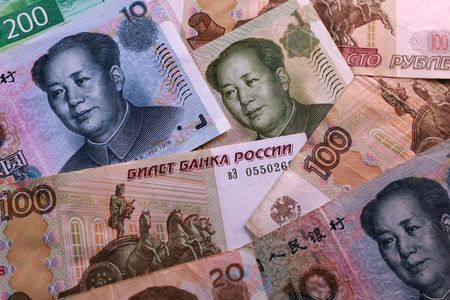By Faith Hung and Jeanny Kao
TAIPEI (Reuters) -Taiwan plans to raise its economic growth forecast this year to more than 5% after the economy expanded by a better-than-expected rate in the third quarter given a strong performance by the crucial tech sector thanks to the AI boom.
Taiwan’s gross domestic product grew 7.64% year-on-year in the July-September quarter, the Directorate General of Budget, Accounting and Statistics said on Friday. That surpassed the 6.0% forecast by economists in a Reuters poll, though slightly lagged the 8.01% growth rate in the second quarter.
The better-than-expected growth will pave the way to raise the full-year forecast to more than 5%, the agency said, from a previous prediction of 4.45%. A formal unveiling of the final forecast for 2025 will come at the end of next month.
“The performance was truly outstanding,” said analyst Kevin Wang of Taishin Investment Advisory. “It mainly benefited from strong demand for AI, driving increased capital expenditure in the cloud industry, supporting robust AI exports, and offsetting the impact of weak exports from traditional industries.”
Taiwan’s key semiconductor chip industry is currently exempt from the 20% U.S. tariffs on Taiwanese exports in effect since August.
Taiwan is in talks with the United States to get that rate reduced.
Taiwan is a major hub in the global technology supply chain for giants such as Nvidia, and home to the world’s largest contract chipmaker, Taiwan Semiconductor Manufacturing Co Ltd, whose semiconductors are widely used for AI applications.
Taiwan’s tech firms have reported roaring demand thanks to the surge in interest in AI applications.
TSMC this month reported a record, forecast-beating quarterly profit, and raised its 2025 full-year revenue forecast on a bullish outlook for spending on AI.
The continued strong growth of the economy reinforces the view that Taiwan’s central bank will be one of the few in Asia to leave interest rates unchanged this coming year, some analysts said.
“The main reasons are mild inflationary pressure and the far better-than-expected economic growth,” said Wang.
Taiwan’s statistics agency will provide revised figures on November 28 with more details and the update of its forward-looking forecasts.
(Reporting by Faith Hung and Jeanny Kao; Editing by Ben Blanchard, Kim Coghill and Andrew Heavens)









